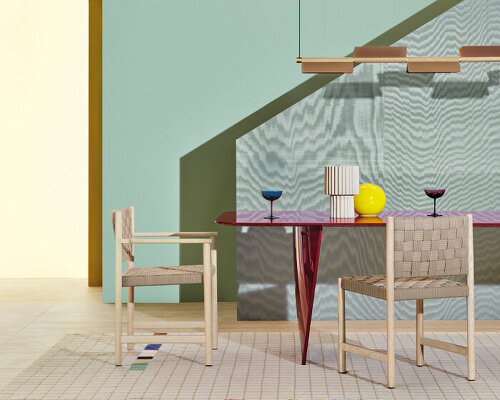INTERVIEW WITH YUSUKE KAWAI ON MODULAR LIGHT FOR PEDRALI
Uniting Japanese craftsmanship with the technical precision of European production, Pedrali presents Kawara, a modular lighting collection designed by Yusuke Kawai. The collection’s aesthetic refinement and technical sophistication is defined by Kawai’s deep rooted appreciation for sacred architecture and a foundational experience in high-tech engineering. Launched at the 63rd edition of Salone del Mobile, the lighting system successfully merges these influences with the 100% Made in Italy production of Pedrali. In an exclusive interview with designboom, the designer shares insights into how the ancient design of the Kawara roof tile was transformed into versatile lighting that prioritizes environmental responsibility.
‘When developing creative ideas, I consider technological aspects in parallel, though sometimes I also start from technology itself. In either case, I aim not just to create concepts, but to translate them into tangible products that can reach people. Kawara’s design explores the tile’s modularity, enabling aesthetic harmony whether used alone or in combination. The form was further inspired by the elegant triangular roofs typical of Japanese temples and shrines,’ begins Yusuke Kawai.
Pedrali launches Kawara lighting collection by Yusuke Kawai | all images © Omar Sartor, set design & styling Studio Milo, courtesy of Pedrali
A SHARED VISION FOR LIGHTING
Pedrali is an Italian company renowned for producing contemporary, functional, and versatile furniture for contract and residential environments. The brand’s collections are developed entirely in Italy, emphasizing internal production, high quality, and a commitment to environmental respect. This ethical, high-precision manufacturing base created the perfect environment for Yusuke Kawai to apply the technical mastery honed during his career in high-tech engineering for major global brands, including Miele, B-Braun, LG, Huawei, and Toshiba. This background drives his focus on structural simplicity and component efficiency. Aligning with Pedrali’s focus on material integrity and product longevity, the two entities found common ground in a shared commitment to sustainable design and uncompromising quality.
‘My design philosophy centers on simplicity. I strive for designs that are simple, yet innovative, unseen, and possess a unique beauty and strength. I aim for simplicity both structurally and in terms of components, which has naturally led to a sustainable approach, such as fewer parts, easy assembly, and disassembly, reflecting Pedrali’s approach,’ explains Kawai.
Kawara translates the spirit of the Japanese roof tiles into an industrial form
KAWARA BRIDGES JAPANESE CRAFTSMANSHIP WITH INDUSTRIAL DESIGN
The integration of the refined methodology of Japanese design into a large-scale, standardized production process became a key narrative of the project. This required an intense focus on how the meticulous detail and philosophical depth of craftsmanship could harmoniously coexist with the demands of industrial material execution.
‘Even with standardized, high-volume extrusion, I wanted to maintain the spirit of Japanese craftsmanship by focusing on every detail. For Kawara, we repeatedly refined the grooves, ridges, and joint elements down to 0.1-millimeter increments, and collaborated closely with engineers to ensure precise assembly. This way, the attention to detail and quality associated with Japanese craft could coexist with mass production,’ explains Kawai.
the collections is available in various versions, including pendant, horizontal, vertical, and floor models
The design of Kawara directly translates the spirit of the Japanese tile into an industrial form. Made of extruded aluminium, the system is designed to be extremely modular and customizable, available in various finishes and versions, including pendant, horizontal, vertical, and floor models. Designers can choose between a single continuous element for a technical, clean, and essential appearance, or adjustable modules connected by small joining rings for precise light direction and a more playful effect. These combinations allow light to be directed towards the table, ceiling, or angled at 45 degrees, offering tailor-made solutions for any setting.
‘At the heart of my concept is the interesting interplay of rationality, surprise, and variety that comes from combining modules. The single continuous element actually emerged as a byproduct of the adjustable modules. The form created through this process turned out to be very beautiful,’ he shares.
made of extruded aluminium, the lighting is designed to be extremely modular and customizable
A significant detail is the grooves running along the rounded back of the modules. This ensures that when different modules are combined, the grooves connect regardless of the angles, turning the design’s versatility into visual harmony. The collection is further enhanced by the integration of a LED strip with a dimmer, which allows brightness to be adjusted, creating the right atmosphere in any space.
‘I believe the modularity and versatility of Kawara not only allow for creative combinations, but also greatly contribute to the long-term value of the product. Even if a room’s layout or atmosphere changes in the future, the modules can be reconfigured to create lighting with a new personality, making it a product that can be enjoyed for a lifetime.’ adds Kawai to describe the principle of creating a design that lasts and adapts.
adjustable modules offer precise light direction and a playful effect
conversely, the single continuous element offers a technical, clean, and essential appearance
Kawara is defined by structural simplicity and component efficiency, aligning with Pedrali’s manufacturing philosophy
the collection is further enhanced by LED strips with a dimmer, which allows brightness to be adjusted
project info:
name: Kawara
brand: Pedrali | @pedralispa
designer: Yusuke Kawai | | @yusukekawai_kmfy
material: extruded aluminium
The post yusuke kawai on transforming japanese roof tiles into modular ‘kawara’ lighting for pedrali appeared first on designboom | architecture & design magazine.

